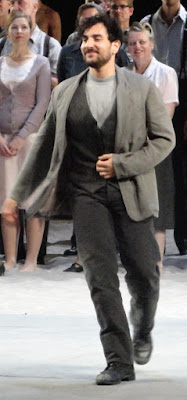(review in English below)
Estreada em 2005
aqui na English National Opera, esta
extraordinária produção da Madama
Butterfly de G. Puccini, da
autoria de Anthony Minghella, vai na
6ª reposição e já foi importada para outros teatros de opera, entre eles a
Metropolitan Opera de Nova Iorque.
Já várias vezes
escrevi neste blogue o meu fascínio por este espectáculo que, sempre que posso
assistir, não perco. É uma das melhores encenações operáticas que tive
oportunidade de ver. Num palco vazio as luzes, os biombos, os panos, as
lanternas e o colorido do vestuário proporcionam-nos um espectáculo de uma
beleza insuperável. Sendo todo ele magnífico, tem dois momentos superlativos, o
final do primeiro acto com a chuva dourada e as lanternas e as marionetas
japonesas bunarko (e sua excelente
manipulação pelos figurantes de negro) que encarnam, entre outros, o filho dos
protagonistas. Foi a primeira vez que assisti ao espectáculo no teatro para o qual
Minghella o criou e achei que foi o melhor, com pormenores que foram
modificados na encenação de Nova Iorque.
O maestro Richard Armstrong ofereceu-nos uma
interpretação musical algo desagradável porque colocou a orquestra quase sempre
em forte, o que prejudicou a audição
dos cantores.
O soprano Rena Harms foi uma Cio Cio San bem
cenicamente, embora não tivesse a figura da jovem de 15 anos (mas quem a tem?).
Vocalmente esteve aceitável, o timbre é algo agreste e faltou-lhe emoção vocal.
David Butt Philip, jovem tenor inglês, interpretou o Pinkerton. Boa
presença cénica e voz agradável e afinada, embora pouco potente. Contudo,
também lhe faltou emotividade.
O cônsul
americano foi o barítono George von
Bergen. A voz é muito expressiva e, ao contrário dos outros solistas, foi emotivo
tanto na fase inicial de cumplicidade com o Pinkelton, como na sua condenação
final.
A Suzuki do mezzo
Stephanie Windsor-Lewis foi uma
cantora de voz poderosa e imponente, mas a personagem ficou muito aquém da
submissa criada que o papel exige.
Matthew Durkan foi um príncipe Yamadori que mal se ouviu e o
Goro de Alun Rhys-Jenkins também não
foi melhor.
Ao contrario do que deve ser a opera, foi um espectáculo
excelente para se ver, mas não para se ouvir.
***
Madama Butterfly, English National Opera, June 2016
Premiered in 2005 here in English National Opera, this extraordinary production of Madama Butterfly by G. Puccini, directed by Anthony Minghella, is in the 6th
revival, and has been imported to other opera theaters, including the
Metropolitan Opera in New York.
I have often expressed in this blog my fascination with this
production, whenever I can watch it, I do not lose the opportunity. It is one
of the best operatic stagings that I had the opportunity to see. An empty stage,
lights, screens, cloths, lanterns and colorful clothing provide us with a show
of unsurpassed beauty. And it has two superlatives, the end of the first act
with the golden rain and Japanese lanterns, and bunarko Japanese puppets (and
its excellent handling by the people in black) that includes the son of the
protagonists. It was the first time I saw the opera at the theater for which
Minghella created it, and thought it was the best, with details that were
modified in the New York staging.
Conductor Richard
Armstrong offered us a musical interpretation somhow unpleasant because he
made the orchestra almost always play in forte,
which jeopardized the hearing of the singers.
Soprano Rena Harms
was a decent Cio Cio San, though she did not have the figure of a 15 year old
girl (but who has?). Vocally she was acceptable, but the tone is something wild
and missed vocal emotion.
David Butt Philip,
young English tenor, played the Pinkerton convincingly. Good stage presence and
pleasant and refined voice, although not strong. However, he also lacked
emotion.
The American consul was the baritone George von Bergen. The voice is very expressive and, unlike the
other soloists, he was emotional both in the initial phase of complicity with
Pinkelton, as in his final conviction .
Suzuki was mezzo Stephanie
Windsor-Lewis, a singer of powerful and commanding voice, but the character
has fallen far short of the submissive maid the role requires.
Matthew Durkan
was a Yamadori prince who was barely audible and Goro’s Alun Rhys-Jenkins also was no better.
Contrary to what should be the opera, this was a great
performance to see but not to hear.
***






































